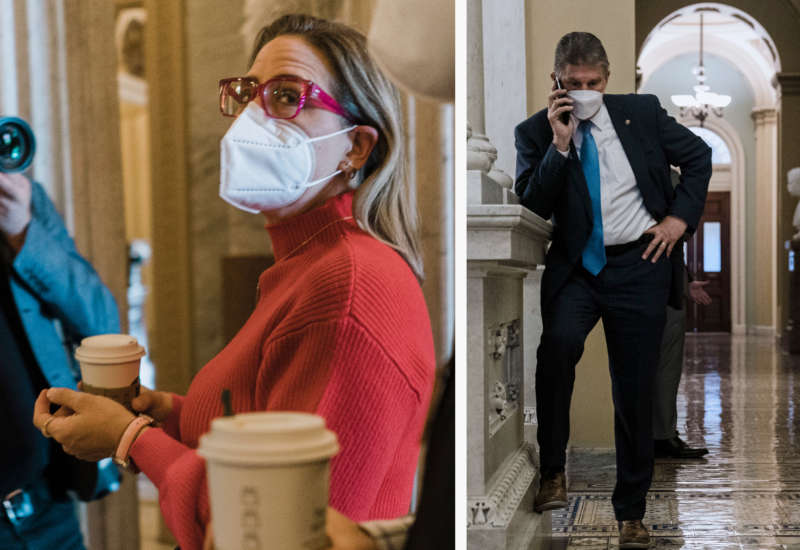Federal voting rights legislation died in the Senate on Wednesday night after Democrats failed to unite their caucus behind a plan to change the filibuster rule, which would have allowed them to circumvent GOP opposition to the bill.
Had a simple majority vote been allowed to advance the bill, its passage would have undoubtedly been successful. But Republicans blocked the voting rights bill using the filibuster, which enables 40 senators to block any piece of legislation they disagree with.
All 50 members of the Senate Republican Caucus voted against the legislation. In order for the bill to overcome a filibuster, at least 10 GOP senators would have had to vote for cloture.
After the voting rights legislation failed to pass, Senate Majority Leader Chuck Schumer (D-New York) moved to change the rules of the filibuster, proposing that it be replaced with a “talking filibuster” that would have required lawmakers to speak non-stop on the Senate floor in order for it to be sustained. But that measure failed after two right-wing Democrats, Sens. Joe Manchin (D-West Virginia) and Kyrsten Sinema (D-Arizona) voted against the proposal.
In a statement after her vote, Sinema claimed that any changes to the filibuster rule — including a modest change like returning to the “talking filibuster” — would “deepen our divisions and risk repeated radical reversals in federal policy, cementing uncertainty and further eroding confidence in our government.”
The two senators were condemned for prioritizing so-called political unity when voting rights were on the line.
“Reverting to Jim Crow-like restrictions is not acceptable in 2022,” Rep. Marc Veasey (D-Texas) wrote on Twitter.
“Let’s not lose sight of the issue at hand: This is about ordinary Americans having to jump burdensome hurdles to cast their votes,” he added.
Rep. Ayanna Pressley (D-Massachusetts) vowed that she and her congressional colleagues would continue fighting to protect the right to vote for all Americans.
“Tonight, 52 Senators chose to save the Jim Crow filibuster rather than save our democracy,” Pressley said. “We won’t stop fighting to defend voting rights and keep power in the hands of the people.”
Prior to both votes on Wednesday, the third-ranking Democrat in the House of Representatives, Rep. Jim Clyburn (D-South Carolina), led House members of the Congressional Black Caucus to the Senate chambers to demonstrate the need for voting rights legislation.
Today, @TheBlackCaucus marched to the entry of the Senate floor to call upon them to pass the Freedom to Vote: John R. Lewis Act and send this critical legislation to the President’s desk.
The time is now. pic.twitter.com/5HHNSx0IiS
— James E. Clyburn (@WhipClyburn) January 19, 2022
“We want the Senate to act today in a favorable way, but if they don’t, we ain’t giving up. I am too young to give up,” said Clyburn, who is 81 years old.
Clyburn, who was a civil rights and voting rights activist before becoming a lawmaker, reiterated his belief that the fight must go on beyond last night’s failed votes.
“Although the Senate’s inaction is disappointing, this is not the end,” he wrote on social media. “Those of us who are committed to our nation’s pursuit of a more perfect Union will continue to heed John Lewis’ admonition to ‘stand up, speak out and get in the way’ to get voter protections signed into law.”
Most Americans support the passage of voting rights protections, even if it means changing the filibuster rule. A Data for Progress poll published this month found that 53 percent of likely voters said they would approve of changing the filibuster if it meant passing the Freedom to Vote Act and the John Lewis Voting Rights Advancement Act, while just 35 percent of respondents said they would be opposed to such an action.
“Protecting the right to vote is much more important to the majority of likely voters than preserving the senate filibuster rule,” said Ethan Winter, political analyst for Data for Progress, in a message to Truthout. “It’s a bit of political cliche, but I do think that people want a government that they can see working. The legislative filibuster pretty clearly impedes this.”
“Those that defend the filibuster often talk about how it’s needed to somehow protect the Senate,” Winter went on. “I would just point out that the approval rating of congress is in the 20s.”


